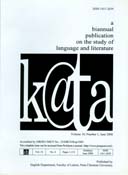Reimagining Peter Pan: The Postmodern Childhood Portrayal in Wendy (2020)
Abstract
As a social construct, the view towards childhood remains to change over time. Literary works, such as films or novels from different periods of time which feature children's characters as the protagonists can be the right medium to identify those shifts. This article analyzes Wendy (2020) film as the latest adaptation of J.M. Barrie’s classic children's novel Peter Pan (1911). This film has made some transformations from the original novel to make the story more relevant in today’s context, including how it showcases childhood that is experienced by the children’s characters. Using textual and comparative analysis, this study attempts to see the transformations in the film adaptation and how it shows a different childhood construction from the one appearing in the source novel. Referring to the concept of postmodern childhood, Linda Hutcheon’s adaptation theory, and Bordwell and Thompson’s elements of film analysis, this study reveals how Wendy (2020) has exemplified the concept of postmodern childhood through the portrayal of children’s roles, children’s agency, and children-adults relationship.
Downloads
References
Bignell, J. (2005). Familiar aliens: Teletubbies and postmodern childhood. Screen. 46 (3), 378-388. https://doi.org/10.1093/screen/46.3.373
Bordwell, D & Thompson, K. (2008). Film Art - An Introduction Eight Edition. McGraw-Hill.
Chappell, D. (2008). Sneaking Out After Dark: Resistance, Agency, and the Postmodern Child in JK Rowling’s Harry Potter Series. Children's Literature in Education. 39, 281-293. doi: 10.1007/s10583-007-9060-6.
Cheal, D. (1993). Unity and Difference in Postmodern Families. Journal of Family Issues, 14(1), 5–19. https://doi.org/10.1177/0192513X93014001002
Franklin, M. (2012). Second to the Right and Straight on Till Morning": The Construction and Distortion of Fantasy In J.M. Barrie's Peter Pan. https://scholarship.tricolib.brynmawr.edu/handle/10066/8264
Hicks, L. (2020, February 29). The Wilderness of ‘Wendy’: A Conversation with Benh Zeitlin. Film School Rejects. https://filmschoolrejects.com/benh-zeitlin-wendy/
Hutcheon, L. (2012). A Theory of Adaptation. ProQuest Ebook Central https://ebookcentral.proquest.com
Ilustrations by F.D. Bedford. (n.d.). Mapping Neverland. http://www.ericrettberg.com/peterpan/?page_id=166
Jenks, C. (2005). Childhood: Second Edition. Taylor & Francis Group. ProQuest Ebook Central, https://ebookcentral.proquest.com/lib/indonesiau-ebooks/detail.action?docID=214758.
Kincheloe, J. (2011). Home Alone and “Bad to the Bone”: The Advent of A Postmodern Childhood. In S.R. Steinberg (Eds). Kinderculture: The Corporate Construction of Childhood. New York: Routledge. https://doi.org/10.4324/9780429495090
Le Roux, S.R. (2016). The Peter Pan Story in the Literary and Cultural Imagination: Exploring the Many Re-imaginings of J.M. Barrie’s Story. North-West University. http://hdl.handle.net/10394/21085
Livingston, G. (2018, April 27). About one-third of U.S. children are living with an unmarried parent. Pew Research Center. https://www.pewresearch.org/fact-tank/2018/04/27/about-one-third-of-u-s-children-are-living-with-an-unmarried-parent/
Loo, H. (2012). Children in Postmodern Literature: A Reconstruction of Childhood. Hohonu 10, 59–61. https://hilo.hawaii.edu/campuscenter/hohonu/volumes/documents/Vol10x15ChildreninPostmodernLiterature.pdf.
McCallum, R. (2018). Screen Adaptations and the Politics of Childhood: Transforming Children’s Literature Into Film. London: Palgrave Macmillan. https://doi.org/10.1057/978-1-137-39541-2
Meynert, M. (2013). Conceptualizations of childhood, pedagogy and educational research in the postmodern: A critical interpretation. Lund University. https://lup.lub.lu.se/search/ws/files/5912966/4438100.pdf
Mook, B. (2007). The Changing Nature of Childhood: A Metabletic Study. Collection du Cirp 1, 137-159. ISBN: 978-0-9781738-7-6. http://www.cirp.uqam.ca/documents%20pdf/Collection%20vol.%201/8.Mook.pdf
Thorne, B. (2009). “Childhood”: Changing and Dissonant Meanings. International Journal of Learning and Media 1(1). 19-27. doi: 10.1162/ijlm.2009.000
Turner, C. (2018). Leaving Neverland for Narnia: Childhood and Gender in Peter Pan, The Secret Garden, and The Lion, The Witch and The Wardrobe. English MA Theses. https://kb.gcsu.edu/english/2
Yoo, H. (2019). Imperialism and the Politics of Childhood Innocence in Peter Pan and Wendy. The Lion and the Unicorn 43(3), 387-405. doi:10.1353/uni.2019.0042.
Zeitlin, B. (Director). (2020). Wendy [Film]. TSG Entertainment.

This work is licensed under a Creative Commons Attribution 4.0 International License.
This work is licensed under a Creative Commons Attribution License





















